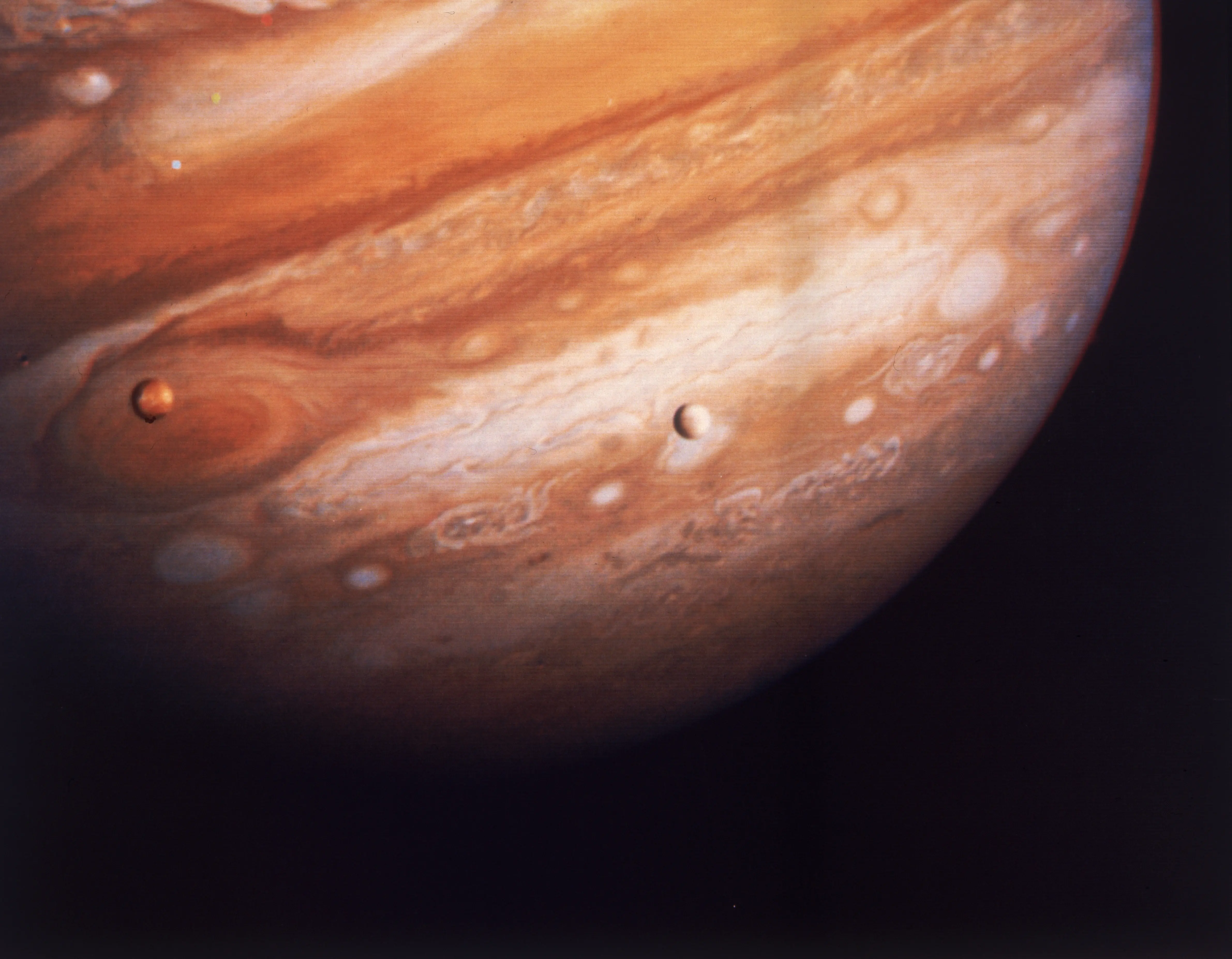What would happen if Jupiter didn’t exist? Study says Earth could have spiraled into the Sun without the gas giant’s protection
-
 Jupiter, the largest planet in our solar system, with two of its satellites, Io on the left (above Jupiter's Great Red Spot) and Europa on the right, March 1979. The image was taken by the Voyager 1 spacecraft. (Photo by Space Frontiers/Hulton Archive/Getty Images)
Jupiter, the largest planet in our solar system, with two of its satellites, Io on the left (above Jupiter's Great Red Spot) and Europa on the right, March 1979. The image was taken by the Voyager 1 spacecraft. (Photo by Space Frontiers/Hulton Archive/Getty Images)A new scientific study suggests that Earth might not exist as we know it today if Jupiter were never around. Astronomers believe Jupiter’s strong gravity has helped keep our planet’s orbit safe and steady for billions of years. Without it, Earth could have slowly drifted out of its stable path and spiraled into the Sun long ago.
Jupiter — the protector of the solar system
Jupiter is known as the gas giant of our solar system and is more than 300 times bigger than Earth. It sits fifth from the Sun, shining like a bright yellowish star in the night sky. But it’s not just a beautiful planet — scientists say it plays a huge role in keeping the solar system balanced.
Jupiter’s powerful gravity helps control the movement of other planets, asteroids and comets. It acts like a massive anchor, holding everything in place and preventing chaos in space. According to researchers, if Jupiter didn’t exist, Earth’s orbit could have become unstable. Over time, this instability might have pushed our planet closer to the Sun making it too hot for life to survive.
What scientists found in the study
In the new study, astronomers used computer simulations to imagine what would happen if Jupiter disappeared from the solar system. The results showed that Earth’s orbit would wobble and change over time. Without Jupiter’s pull, Earth could either fall toward the Sun or move too far away, freezing in deep space.
The researchers said this shows how important Jupiter is to our solar system’s balance. It doesn’t just affect Earth — it also helps keep the other planets in line. Jupiter’s gravity keeps things from colliding and controls how smaller objects like asteroids move through space.
Jupiter’s role as a cosmic shield
Jupiter not only keeps its orbits steady — it also protects Earth from dangerous space rocks. Its gravity pulls in or deflects many asteroids and comets that might otherwise crash into our planet. Astronomers believe that during the early days of the solar system, Jupiter helped clear out a lot of the debris that could have hit Earth and destroyed it.
Even today, Jupiter still acts as a cosmic bodyguard. In 1994, astronomers saw a comet called Shoemaker-Levy 9 break apart and crash into Jupiter. If the gas giant hadn’t been there, that comet could have headed toward the inner planets — including Earth.
Why Jupiter’s presence matters
The study also helps explain why our solar system may be so special. A lot of planets have been discovered outside our solar system called exoplanets, that don’t have a giant Earth-like Jupiter. That might mean they don’t have the same kind of protection or stability that Earth enjoys.
It also reminds us that everything in our solar system is connected. The Sun gives us light, Earth gives us life and Jupiter still keeps the balance, holding the system together with its enormous graveness.
So, what would really happen if Jupiter didn’t actually exist? Scientists say Earth might not have survived at all. Without Jupiter’s steadying pull, our Earth could have lost its orbit and been drawn into the Sun or floated down into cold space.
Jupiter’s presence is one of the reasons life on Earth is indeed possible. It keeps our Earth in the right place, at the right distance and protects it from the chaos of space. Indeed, though it’s hundreds of millions of light-years down, Jupiter is like a silent guardian — keeping Earth safe, steady and full of life.
TOPICS: Jupiter